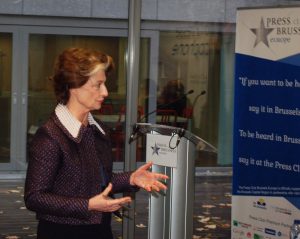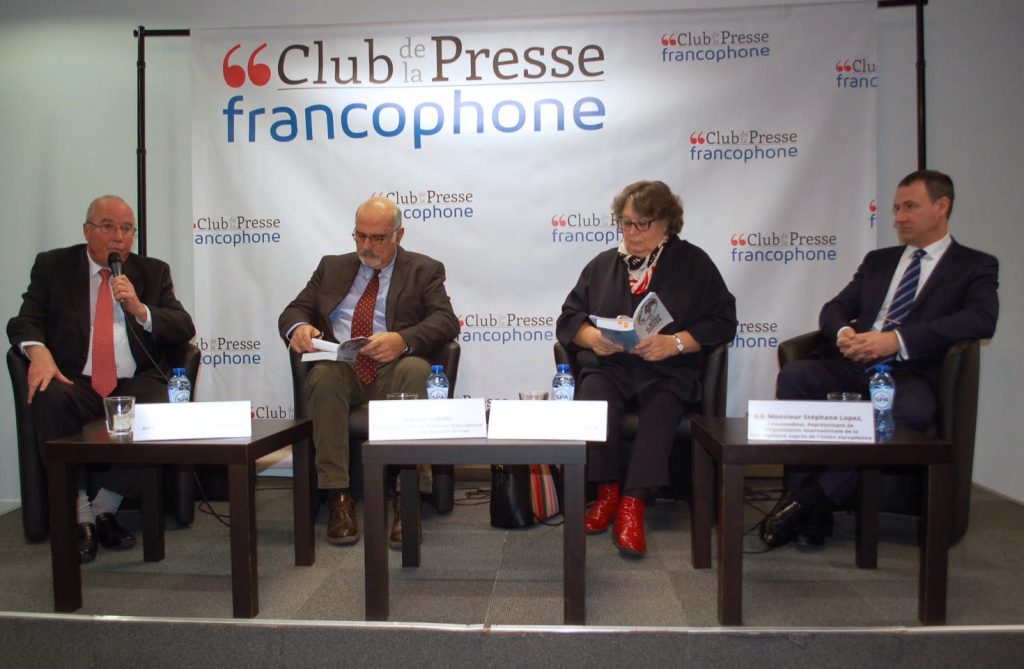On Wednesday 29 November, at the initiative of the Permanent Francophonie Representation to the European Union, the French Press Club organised, in the presence of the authors, a debate on the book “… And the world will speak French “.
“French will be the first language in Africa.” On official travel to Burkina Faso, in front of a crowd of students from the University of Ouagadougou, Emmanuel Macron marks a brief pause, then raised the stakes “maybe even the world!” Released from the neighbouring continent, this handful of words resonates to Brussels where, on a gray Wednesday at the end of November, the French Press Club – gathering, since 2016, press correspondents, ambassadors, diplomats and other actors likely to promote the use of the French language in the different European institutions – met to discuss the book “... And the world will speak French“, by Roger Pilhion and Marie-Laure Poletti.
Present for the occasion, the duo of French authors does not seem as enthusiastic about the perspectives outlined by its president. “If we act intelligently, French will once again become a great world language, not the greatest. In Africa, it’s different. If we manage to free ourselves from the social segregation to which French is still strongly linked, and that we actively focus on teaching, French will be the largest language in Africa, “says Roger Pilhion. The latter, however, welcomes the French President’s willingness to abound in the direction of a revalorisation of this language which was, until the inter-war period, that of international diplomacy, before gradually turning in favour of English.
The Anglo-Saxon hegemony
Because the evidence is there: whether economic cooperation activities carried out by private actors, policies shaped within international organizations or the European Union, communication maintained by their institutions with different media, each discipline, a little bit turned towards the world community, now undergoes the exclusive hegemony or leadership of the English language. A language that is not only far from being perfectly mastered by many actors who are forced to use it in the course of their duties, but also carries an Anglo-Saxon model and culture that they certainly deserve to be welcomed – although the question arises more in this post-Brexit period – can not be the only reference in a Europe steeped in multilingualism and cultural diversity. “Defending multilingualism means contributing to the plurality of ideas and methods. A language is not neutral. It carries a representation of the world. It makes it possible to focus on problems in a different way, to try other angles of attack. Plurilingualism is a primary building block of European identity. The domination of a single language in European institutions is a misinterpretation that removes Europe from people,” explain the two authors.
 To be aware of Francophones
To be aware of Francophones
If we understand, therefore, the interest of the French-speaking world to defend the influence of its language – we could also mention the issues related to economic exchanges, the export of cultural products, the many jobs created by the labour market. French as a foreign language … – it is still necessary to determine the method likely to place it at the center of practice. This is the challenge of the book passionately discussed today which, although addressing “the widest possible public“, also turns to the French political authorities to “indicate to them the changes that must urgently intervene in France “. Of the many technical indications that we can not pass on exhaustively in these lines, we will retain, above all, the fundamental importance of granting more resources and structural support to “French and English education”, not only in our countries but also in Africa, in the Arab world and even elsewhere on the planet. It is equally important, according to the authors, to actively support the use of French in international organizations as well as in the business world. In part, this involves a policy of awareness raising among Francophone populations. “Most French people define themselves as French, not Francophones. They are not aware of the opportunities, for example economic, that their language offers them. It is necessary to develop among the population, executives, students, this awareness of being francophone.”
A constructive welcome
Meticulously substantiated, the book seems to have been welcomed with interest by Emmanuel Macron’s political entourage. “Jean-Baptiste Lemoyne, Secretary of State for the Minister of Europe and European Affairs, participated in the launch of the book, which he considers a real roadmap,” says Roger Pilhion. Claude-France Arnould, French Ambassador in Belgium, was present this Wednesday at the Press Club. With this in mind, she confirmed the interest of the President for this “road map”, adding, while remaining rather vague, and currently leaning towards a project to promote multilingualism in Brussels. “Many of today’s ideas are a great source of inspiration. Do not hesitate to send me more in the next 10 days. The call is launched.”
the Editors



















